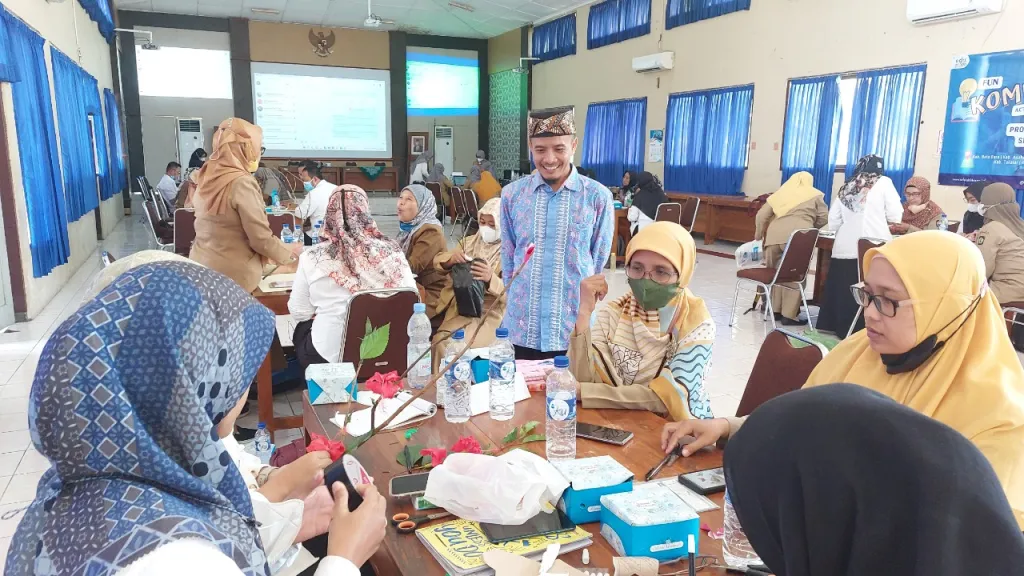BOGOR — The Indonesian Literacy School (Sekolah Literasi Indonesia/SLI) is a program of the Dompet Dhuafa Human Development Institute (LPI DD), which aims to realize a quality school model that concentrates on improving school leadership, learning systems, and school culture with literacy exceptions. In 2021, SLI received a mandate from the Driving Organization Program (POP) of the Ministry of Education and Culture of Research and Technology under the name of the Learner School program, which has the aim of optimizing literacy-based school culture through the intervention of the uswah method to the principal and the application of the 10 Teacher Leadership Values.
One way is assembling a community as a forum for teacher learning in 11 POP-assisted areas. SLI held Fun KOMED Activities (FKA). KOMED, or Learning Media Community, is one of the communities as a learning forum for teachers who focus on learning media development content.
This Mobilizing Organization Program is in the form of literacy development in schools in various regions in Indonesia. The Mobilizing Organization Program is a program created by the Ministry of Education and Culture to encourage the presence of Mobilizing Schools that involve organizational participation. The main focus is on improving the quality of teachers, principals, and education personnel to improve student learning outcomes.
SLI Dompet Dhuafa collaborated with KOMED under the support of Dhompet Dhuafa to participate in the success of the development of the National Literacy Movement (GLN). A total of 12 KOMED administrators were sent as resource persons in POP-Fun KOMED Activities activities in 15 regions scattered throughout Indonesia. The twelve administrators are Arie Wijayanti (Bogor), Suyanto (Donggala), Hj. Anita (Takalar), Fajar Kurnia Aji (Gowa), Darma Yeliza Putra (Asahan), Ira (Coal), Titin Mulyaningsih (Bima), R. Ida Wardatul (Dompu), Purwanty Setyawati (East Lombok), Febri Reviani (Hulu Sungai Utara), Purwato (Kulon Progo), and Mirna Kartika (Denpasar). These speakers brought the mission of the Creative Literacy Class Module (KLiK) and the implementation of the Simple Learning Media Workshop. This module is a step in the selection of literacy-based activities. The KLiK concept compiled by the Indonesian Literacy School Team is a concept of implementing multiliterate, meaningful, fun, and creative activities.
Literacy is not just a reading and writing activity but is deeper and more meaningful. Literacy activities should lead to clear goals, with structured, child-centered, and contextual stages. In addition, Literacy activities are not only fun activities but also able to give deep meaning and multiliterate. In this case, multiliterate combines several literacy activities from 6 (six) basic literacy levels. The six basic literacy are literacy, science, numeracy, digital, financial, cultural, and citizenship. This activity also contains the competence of the 21st century. That is how to create activities stimulating critical, effective, communicative, and collaborative thinking for children.
KLiK activity was also chosen based on contextual principles, right on target, novelty or novelty, and implementation. This activity is expected not to burden teachers but, on the contrary, to help teachers in realizing a literate generation.
This literacy activity is also expected to be able to cultivate the value of self-lamps or character values in children. Broadly speaking, the “LITERACY” stage in this KLiK module can be described as LI, which means seeing and observing. Children must be invited to see and observe directly every phenomenon around them. The next stage is TE which means defining the problem/setting a goal. The phenomena that the child observes will invite various questions as the discovery of issues that require explanation. From the problems they encounter, they will proceed to find a solution as a goal. Next, RA is an excitatory understanding of the child. Children are invited to understand through experiments, demonstrations, and work, which can help them understand what is being learned. The final stage is SI, summarizing the result. The child learns to draw conclusions from the phenomenon with experiments in the learning he conducts. The findings obtained are expected to be able to be implemented by the child in everyday life.
An equally critical value is cultivating spiritual value in children, vertically with the Creator, Allah SWT, and horizontally with the relationship between humans and humans and their natural environment.
The resource persons conveyed the implementation of this KLiK module pleasantly in the form of demonstrations and conducting simple experiments. In a simple learning media workshop, teachers are invited to create exciting learning media according to the stage of child development.
Each speaker departed on a different day. Many stories are taken home. Starting from the trip, upon arrival at a location that is not urban, during activities, to exciting return stories. Some are the first experiences of flying, visiting remote areas of the archipelago, and traveling alone and independently. Stories that are memories and experiences in the context of developing self-competence. Hopefully, this story-filled journey will be a self-encouragement.
Written by: Contributor to SLI Dompet Dhuafa, Titin Mulyaningsih, M.Pd.



